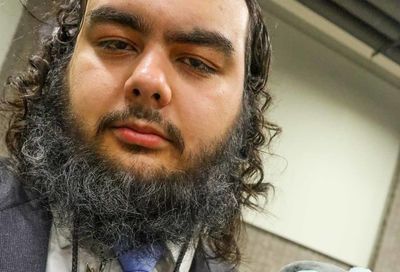Three of Ohio’s Trans Candidates Will Remain on Ballot
A trio of transgender candidates will remain on the Democratic primary ballot despite not having their deadnames on their election paperwork.

Three transgender candidates for the Ohio Legislature who had been threatened with being removed from this year’s primary ballot for not including their “deadnames” on their election paperwork have been cleared to run for office.
However, due to an obscure Ohio law — and the failure of elections officials to notify candidates of it — any of the three could see their ability to serve challenged if they are victorious.
Additionally, a fourth transgender candidate for office, who was disqualified for the same reason, has had her appeal denied.
As reported by The Associated Press, the Mercer County Board of Elections chose not to disqualify Arienne Childrey, a Democrat from St. Mary’s, Ohio, whose candidacy for the 84th District seat in the Ohio House of Representatives was challenged after Mercer County Republican Party Chairman Robert Hibner filed a protest with the elections board.
Hibner argued that Childrey had violated a little-publicized state law requiring public office candidates to list any name changes they have had over the previous five years on their election paperwork.
The law contains some exceptions, including for those who change names after marrying or those running for re-election, having previously been elected by voters under their new name.
While the law was not intended to address transgender existence, it has since been weaponized against transgender candidates.
However, the law is not listed in the 33-page candidate requirement guide from the Ohio Secretary of State’s office, and there is no space to list any previous names on the paperwork for petition signatures, which candidates must collect from a certain number of registered voters to qualify for ballot status.
Childrey previously told NBC News that while she disagreed with having to provide her deadname, which does not reflect her identity, she would have done so had she known of the name-change requirement.
The Mercer County Board of Elections unanimously rejected Hibner’s protest, ruling that, since the ballot is for the upcoming March 19 primary, Hibner, as a member of an opposing party, has no standing and his demand that Childrey be disqualified from the ballot is invalid.
If Childrey wins the Democratic primary, as expected, she’ll automatically appear on the general election ballot as the party’s nominee.
“I do believe that this was primarily an opportunistic attempt to seize on a relatively obscure law,” Childrey told Metro Weekly in a brief interview. “This attempt was motivated because I am a trans person running for office and have expressed opposition to the moves and motives of the Republican Party in this area.”
Childrey is running unopposed in the primary and will likely face off against Rep. Angie King (R-Celina), the sponsor of a bill to ban drag performances outside of adult entertainment venues. King has voted for various pieces of anti-LGBTQ legislation, including a bill that bans gender-affirming care for transgender minors and bars trans athletes from female-designated sports teams. That bill was recently vetoed by Republican Gov. Mike DeWine, only to have Republicans, including King, override the veto.
Two other trans candidates, Ari Faber, running for State Senate District 30 in southeastern Ohio, and Bobbie Arnold, running for State House District 40 in the Dayton area, were also cleared to run for office. However, Faber must appear on the ballot with his deadname because he has not legally changed it yet.
If Childrey, Faber, or Arnold were to emerge victorious in the general election, Republicans, who hold a nearly-unbreakable majority in both chambers, could still seek to remove them from office for violating the candidate name-change law.
However, Childrey told Metro Weekly that all three candidates have been in conversations with an elections attorney and believe they would be able to make a credible case that the name change law is problematic and that they should be allowed to serve.
“There is legal precedent in the state of Ohio for it,” Childrey said.
Meanwhile, Vanessa Joy, a fourth trans candidate who was seeking the 50th District House seat, remains disqualified after trying to appeal her removal from the ballot by the Stark County Board of Elections.
She is currently working with legal counsel and the Ohio Democratic Party to try and change the name-change law. She told the AP that the current law places an additional barrier in the way of transgender individuals who don’t wish to be associated with a name that does not align with their gender identity, and may discourage some potential candidates from running.
Ohio Secretary of State Frank LaRose, a Republican, said that while his office would be open to including the law in the state’s candidate guide to inform potential candidates, it’s up to those individuals to ensure they are in compliance with all of Ohio’s laws.
Gov. Mike DeWine recently weighed in on the disqualification controversy, telling The Plain Dealer newspaper that the law should be changed to allow trans individuals to seek office without listing their gender identity.
“We shouldn’t be denying ballot access for that reason,” he said. “It certainly should be fixed.”
But he also said he was uncertain of whether it would be best to add a box on election forms providing a space for past names, or to change the law to eliminate such a requirement. “We should be able to fix it, but I haven’t really thought that much about how to do it,” he said.
Childrey is eager to start campaigning.
“I hope that what people will take away from this race is that LGBTQ candidates can speak on the issues that affect all of us,” she told Metro Weekly. “I am not running as just a trans candidate or to only represent Democrats, but all of the people in my district.”
To that end, she is focused on issues like education, criticizing the state’s voucher program, which she derides as “welfare for the wealthy,” calling for increasing teacher salaries, and warning of the need for action to address Ohio’s aging crisis — in which the over-65 population is growing at a rate four times that of the rest of the state’s population — by addressing the need for nurses and professional caregivers who will be needed to better serve aging members of the community.
Childrey criticizes lawmakers for their obsessive focus on culture-war issues, noting that they tend to only exacerbate divisions.
“We need to focus on who we can help rather than who we can hurt,” she said.
Childrey is also critical of the incumbent state representative, accusing King of dividing the community by stressing social issues and using inflammatory rhetoric to demean political opponents, including LGBTQ individuals. For instance, when King touted her anti-drag bill, several opponents protested outside the Mercer County Courthouse.
King subsequently authored a Facebook post describing the protesters as “adults who feel it’s their right to twerk and gyrate in front of your minor children.”
“I have a personal grudge against anyone who attacks the civil rights of me or anyone else like me,” said Chidlrey. “I don’t know her personally — and I’m sure her friends and family would say she’s a ‘good person’ — but the policies she’s putting up, and rhetoric she’s putting out against people like me, who are just trying to live our lives in our communities, I do take that personally.”
Support Metro Weekly’s Journalism
These are challenging times for news organizations. And yet it’s crucial we stay active and provide vital resources and information to both our local readers and the world. So won’t you please take a moment and consider supporting Metro Weekly with a membership? For as little as $5 a month, you can help ensure Metro Weekly magazine and MetroWeekly.com remain free, viable resources as we provide the best, most diverse, culturally-resonant LGBTQ coverage in both the D.C. region and around the world. Memberships come with exclusive perks and discounts, your own personal digital delivery of each week’s magazine (and an archive), access to our Member's Lounge when it launches this fall, and exclusive members-only items like Metro Weekly Membership Mugs and Tote Bags! Check out all our membership levels here and please join us today!

























You must be logged in to post a comment.